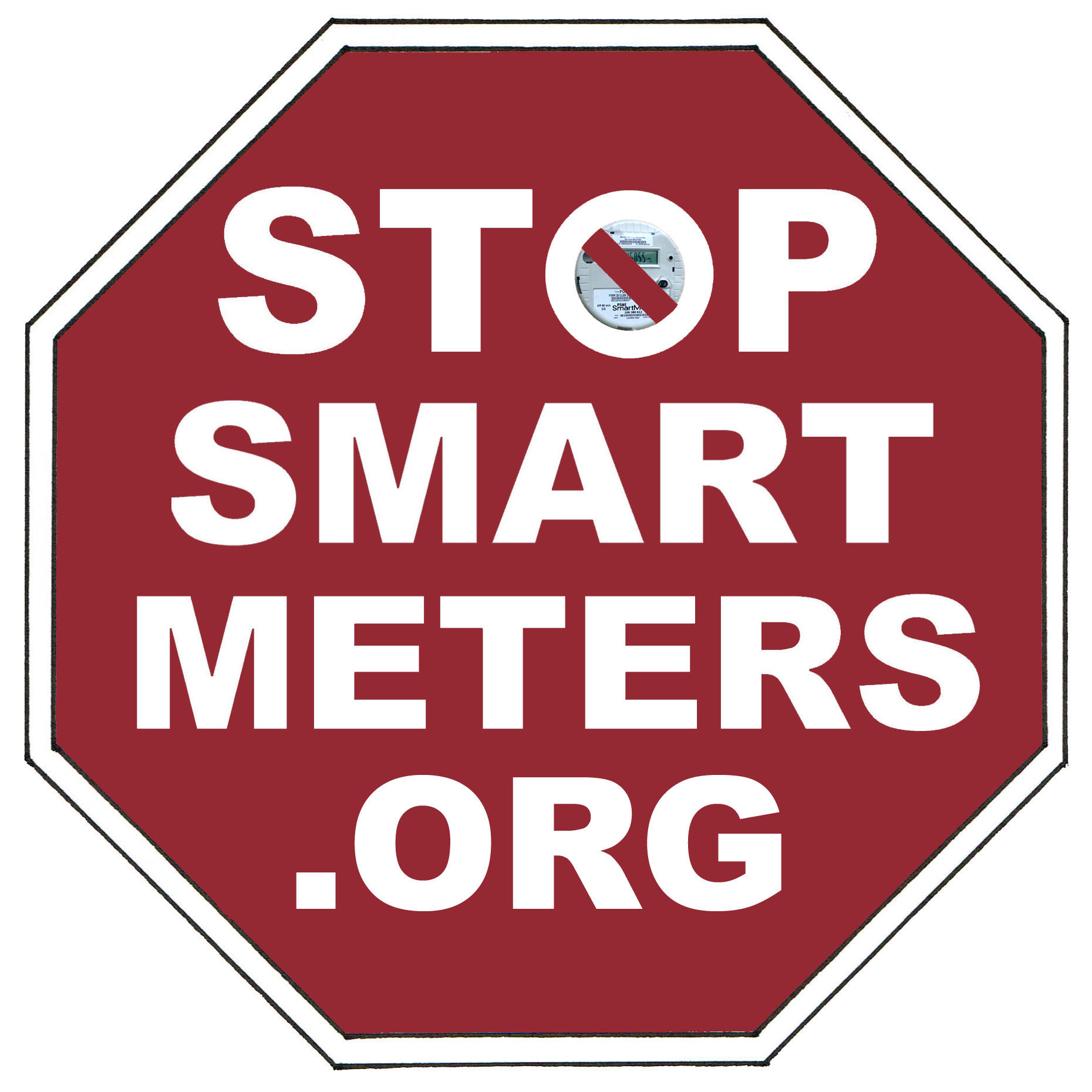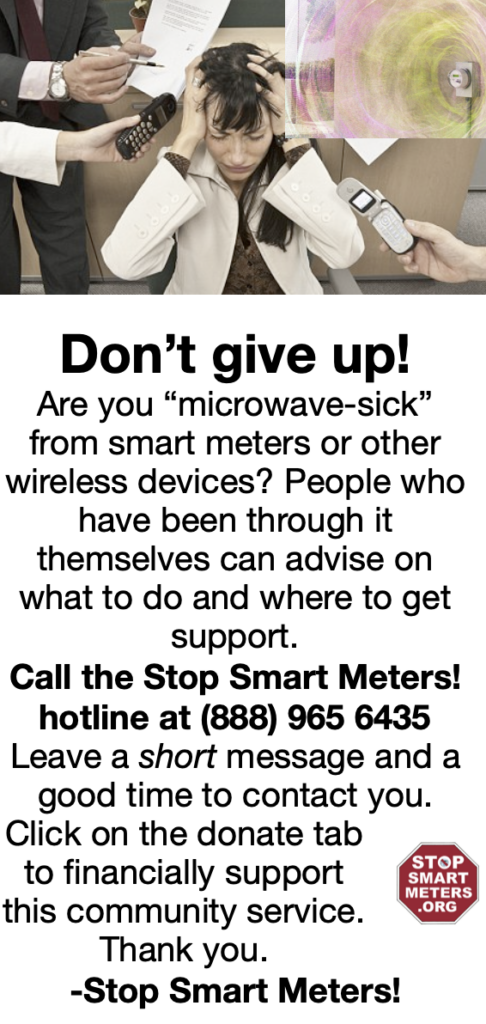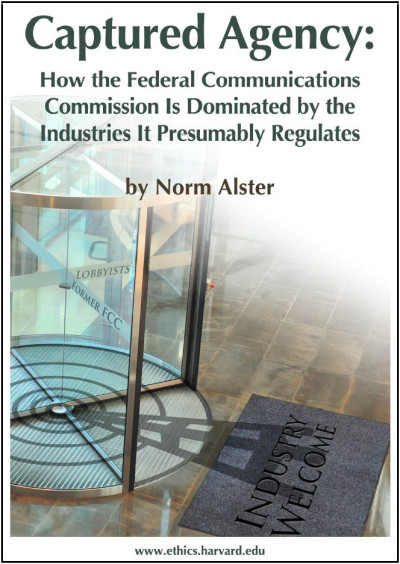An international grassroots resistance against smart meters has been going on for more than two years now, but you wouldn’t know it if you got your news solely from national broadcast TV. That changed on Friday when PBS Newshour aired a segment on the health and privacy debate around smart meters. Better late than never.
You know the industry is getting desperate when they have to recycle 7 year old statements from the World Health Organization to distract from the 1 year old statement (pdf) saying there’s a problem with microwaves and cancer. Despite the fact that the scientific studies we sent to PBS were not presented, that only experts from the pro-industry side were interviewed for the piece, and that it appeared only Californians were up in arms about the deployment (and then only 12 cities, not 57 local governments that we told PBS about) we suppose that the fact that they are acknowledging that there is a major debate over health and privacy issues related to the smart grid- is a giant step forward for the corporate media.
One interesting aspect of the piece is the extent to which the CPUC- meant to be regulating the utilities to protect our wallets, safety, and health, is placed in the role of championing the smart meter project in spite of its damaging impact to all three of these goals. PG&E almost looked like a reluctant kid sister pulled along for the ride.
There is a detailed analysis about the piece, along with various comments from activists and professionals working on this issue, over at EON’s site. Please also go to the PBS site and try and leave a comment- though we hear people have submitted comments and they have not been published. Something to make you go, “hmmmmm….”









The liberal media is an absolute joke and a waste of time, especially PBS. Remember when National Geographic told us that the Amazon forest would disappear? We watched as they implanted rf devices into living creatures all over the world. They told us it was “choice” to abort over 50 million babies in America (worse than Hitler). Most brainwashed people rely on the media for their information. They are more interested in wether someone is wearing underwear, cheating on their spouse, or watching a bunch of sweaty men run around with a ball. They lied when they told us we came from pond scum so why would they start reporting true facts now? We all know media is funded by wireless. What business in their sane mind would expose their best customer? We are not the customer by the way.
Agenda 21 has saturated ours minds and lives.
Anyway, this guy explains what is really happening and why.
http://www.youtube.com/watch?v=09mpvscHiKI&feature=youtube_gdata_player
Why wouldn’t anyone believe Josh’s story? Do you really think he would leave out important information touted on this site repeatedly? Just look at the upper right hand corner. The World Health Orginization classification of electromagnetic fields into the class 2b (same as lead paint) over a year ago was totally ignored. We also got another odd close up of Josh’s face ( just something I have observed from other interviews he has given).
I have seen a couple of interviews on other networks where they blatantly interview the wrong specialist. For an example, asking an auditory doctor if it’s possible to have sleep disturbed by the smart meter or a nuclear radiation specialist if non ionizing radiation is harmful. One would not take their car to a muffler or radiator repair shop for a computer problem. I have had in depth communications with a couple of reporters. Instead of listening and researching the information given one just totally ignored the studies and proceeded with the notion I was in the same class as an exorcist. The other switched to a newbie reporter, that had no clue what I was talking about, within an hour of meeting.
They all have one thing in common…they continue to interpret the story wrong. So when someone complains about being censored by the media I wouldn’t doubt it for a minute.
“…try and leave a comment- though we hear people have submitted comments and they have not been published. Something to make you go, “hmmmmm….”
Nothing to see here folks. Stop spreading fear by implying that the people are not being heard, or that their views being suppressed… Given the profane content with some of the older posts, I can’t imagine they have much of a filter in place. Any missing comments are more probably user error.
Lol, go Richard go! Disinformation is his game.
Disinformation?! After your little diatribe, Paul, any other post will pale in comparison.
Sometimes the truth does hurt, but my claims are made honestly. Some may see your fallacious arguments more damaging.
Yes Richard, You are absolutely correct.
I am glad you were able to point out , that Thousand of expert web users for some strange reason have their stars crossed and their web experience forgotten, where they become incapable to leave a simple comment and have it logged correctly.
Thousands? Really, George…? And exactly how many instances do you actually know of?
How about providing some substance…Why don’t the posters then post their comments **here** so that we (the community) can see and understand what they claim was ignored or suppressed by PBS. If their claims are true, them damn PBS; but if not, then their claims rest on the same wobbly legs as so many others on this site.
I know I’ve commented on other threads, but my comments were never approved by the moderator on this site. Hmmm
http://www.onlinesentinel.com/news/Maine-PUC-to-investigate-health-and-safety-of-smart-meters.html
July 25
Are smart meters hurting Mainers?
The Maine Public Utilities Commission wants an answer – and decides to investigate safety concerns.
By Tux Turkel tturkel@mainetoday.com
Staff Writer
HALLOWELL — In voting Tuesday to investigate the health and safety of wireless “smart meters,” the Maine Public Utilities Commission set in motion a legal and technical case that’s expected to be followed nationally by the power industry and citizen activists.
click image to enlarge
By voting Tuesday to investigate the health and safety of wireless “smart meters,” the Maine Public Utilities Commission set in motion a legal and technical case that’s expected to be followed nationally by the power industry and citizen activists.
Gordon Chibroski / Staff Photographer
Select images available for purchase in the
Maine Today Photo Store
While it’s too soon to say how comprehensive Maine’s review will be, no state utility agency has held public hearings or conducted its own research into whether radio-frequency radiation from the digital devices is harmful to electric customers, according to Dan Richman, who has spent three years covering the topic for the online trade publication Smart Grid Today.
“If Maine commissions original research or holds hearings, it would be the first time a PUC had done that,” Richman said.
California’s PUC did its own review of smart-meter research literature but hasn’t held hearings, Richman said. Original research could take years and be very costly, he added.
The time frame and scope of the new proceeding are still being decided, but David Littell, one of the two commissioners who will decide the case, said he wanted to move quickly. The commission’s order, released Tuesday afternoon, calls for key parties to meet Aug. 2 to consider a schedule and to review petitions to intervene.
The order comes nearly two weeks after the Maine Supreme Judicial Court ruled that the PUC failed to resolve health and safety issues when it approved Central Maine Power Co.’s installation of smart meters.
In a decision released on July 12, the court sided with opponents of the digital meters, who argued that regulators ignored their legal mandate to ensure the delivery of “safe, reasonable and adequate service.”
At the same time, the court didn’t agree with the argument that the meters violate constitutional issues related to privacy and trespass. It’s likely that opponents will file a motion this week asking the court to reconsider the privacy and security issues, according to Bruce McGlauflin, a lawyer representing smart meter foes.
The PUC’s action reopens public debate over an issue that has drawn national attention and led some electric customers to pay extra each month not to have one of the wireless units installed at their homes.
The $200 million project, which received half of its funding from federal stimulus dollars, is now largely complete. The fact that nearly 615,000 new meters have been installed raises the question of what utility regulators could do if they determined that the meters are a threat to health and safety.
In an interview following the deliberations, Littell declined to comment on the practical effect of any decision, or whether it would even be possible to replace the meters.
“We’re going to look hard at this issue,” he said of the health and safety complaints.
Smart meters transmit information about electricity using wireless technology that emits radio frequency radiation, similar to a mobile phone.
Many utilities around the world are moving to smart meters, which can give customers more information about their energy use patterns and allow power companies to pinpoint problems during outages. The companies maintain the equipment is safe and no different than other common wireless devices, such as cellphones.
But opponents say the radio-frequency radiation emitted by the wireless meters can cause health problems, including sleep loss and dizziness, and are an invasion of privacy because of the information they collect.
While radiation also is emitted from devices such as cellphones and wireless networks, smart meters have become a “flashpoint,” McGlauflin said, because they now are a government mandate.
“People are being forced to have these things in their homes,” McGlauflin said.
As the PUC case unfolds, smart meter foes such as Ed Friedman, the lead plaintiff who brought the case to the Supreme Judicial Court, will try to expand the scope of the investigation. They will push for testimony from experts who have documented health problems that they link to smart meters.
After Tuesday’s deliberations, Friedman said he’d like to see all the new devices taken out and replaced with non-wireless meters.
Elisa Boxer, who organized the initial opposition to smart meters two years ago, said she’d like public hearings held around the state, making it possible to receive testimony from people who say they have suffered health problems since the meters were installed.
“All along, I just wanted the truth to come out,” she said.
CMP, on the other hand, is expected to press for a limited review.
“The commissioners agreed to open a proceeding on the narrow issues remanded by the court, as we expected,” said John Carroll, CMP’s spokesman. “We do appreciate their interest in moving the matter ahead expeditiously.”
The controversy in Maine began with a PUC order in 2010, which started CMP on the path of switching out its analog meters with smart meters. Soon after, some residents began complaining about various health impacts and concerns that they believe are linked to the meters and the wireless network that connects them.
The PUC had said there was no need for the panel to tackle safety concerns that already had been addressed by federal agencies. It also took note of a review of research literature by Maine’s Center for Disease Control that found no evidence to support concerns for health effects.
As a compromise aimed at addressing the health concerns, the PUC allowed customers to opt out of smart meter installation. But they must pay $40 up front and a $12 monthly fee to cover the cost of alternative equipment and meter readers.
That arrangement didn’t satisfy Friedman and several customers, who filed a complaint seeking a full investigation by Maine regulators. The PUC declined to do that, and the customers appealed the commission’s dismissal to the law court.
To date, roughly 8,500 customers have opted out, according to CMP.
Opponents including Friedman think that number would be higher if the opt-out charge were eliminated. In Vermont, lawmakers this spring voted to allow customers to opt out, with no fee, while regulators evaluate the actual costs of the program.
Tuesday’s decision to open an investigation was approved by Littell and a recently appointed commissioner, Mark Vannoy. The Maine PUC’s chairman, Thomas Welch, is not participating in the smart meter deliberations because of previous private-practice work he performed for CMP.
Staff Writer Tux Turkel can be contacted at 791-6462 or at:
tturkel@mainetoday.com
Were you interviewed for this story? If so, please fill out our accuracy form
Send Question/Comment to the Publisher
I’ve posted several times on threads here and never had my comments published. I don’t swear or say anything wildly controversial (imo). I’ll have another go.
My problem with this website is that it uses such a wide brush to try and tar smart meters. It seems like it takes any story it can find, regardless of how trivial or even, in some cases, nonsensical, and then presents them all as a large body of evidence.
In amongst it all there are valid concerns about privacy. I’m not as convinced by the electro-sensitivity stuff. However if people really believe it to be a problem they should be allowed a wired alternative (but perhaps only once they show their house is free from wifi / cell phone / cordless house phones).
I think the Green aspects of Smart Metering have been overplayed, the real reason the Electric companies like it is because they can read your meter without having to send a man round. It save them lots of money. Perhaps if you opt out of smart metering you should pay a small premium to have your meter read by a man instead.
Be wary of new initiatives, that’s fine, but also be aware that lumping together every half baked tittle tattle you find about wireless and smart metering can easily lead people to dismiss you as the tin-foil hat brigade.
Wow! PBS does a better job investigating deaths of cell tower climbers than of the deaths from the smart meter.
http://video.pbs.org/video/2237911445